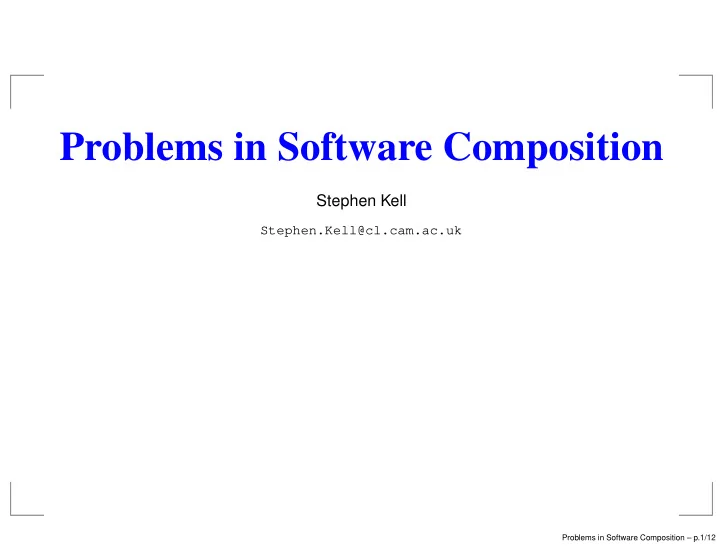

Problems in Software Composition Stephen Kell Stephen.Kell@cl.cam.ac.uk Problems in Software Composition – p.1/12
About this talk This talk is an introduction to some problem areas about questions, not answers supposed to be interesting to all supposed to generate feedback not quite finished Problems in Software Composition – p.2/12
Developing software is hard Developing a big project from scratch is hard. But so are: extending existing software, without source extending existing software, with source re-using existing software (in a new project) re-using existing software (together with another existing piece) extracting a piece from a bigger piece removing a piece from a bigger piece replacing an existing piece with another piece Why? Many reasons, mostly rooted in unanticipated nature. Problems in Software Composition – p.3/12
Some example scenarios Consider Firefox. It consists of many functionally-separable components has several dependencies (kernel, libc, helper apps...) contains code useful in realising novel functionalities Suppose we want to do the following with Firefox: extend to support storing bookmarks in a database compose with libhttpd to make peer-to-peer web client replace local history log with calls into system-wide log extract tabbing widget logic What makes them hard? Easier than they might be? Problems in Software Composition – p.4/12
Summary of problems no suitable extension interface (part-) reimplementation unavoidable constrained choice of language complex APIs are hard to understand (semantically) mismatched interfaces need to write much ad-hoc non-reusable (glue) code tendency for tight coupling of new code to existing artifacts of packaging permeate source two “interfaces”: ideal A , and actual C C → A adaptation is a source of coupling Problems in Software Composition – p.5/12
Example 1: imap-status My first Python code: a script which outputs the status of each folder in an IMAP folder tree. Some quick and dirty measurements: 100 lines total, of which 15 lines core functionality 5 lines language boilerplate 5 lines documentation (“usage” printout) 35 lines input retrieval and unpackaging 20 lines adaptation and workarounds 10 lines output packaging 10 lines blank Problems in Software Composition – p.6/12
Anatomy of a solution We need at least two things: a way of specifying components such that they can easily be composed a problem of languages and tools a way of composing such components in the static case, a tools problem in the dynamic case, a systems problem The following would also be nice: a refactoring approach, to improve composability of legacy components useful software measurements, for evaluation Problems in Software Composition – p.7/12
Why involve the operating system? (1) What is an operating system anyway? secure multiplexing of hardware support for abstraction avoid compulsory abstractions in OS (Exokernel) also avoid them in applications! diagram goes here Problems in Software Composition – p.8/12
Why involve the operating system? (2) What characterises the things that should go in the operating system? elevated privilege generality: no undue compromise to any application A service for the composition of software could satisfy these. This means a linker capable of (programmed) semantic adaptation. Other arguments: precedent, inclusivity (“end-to-end razor”) efficiency OS manages many application concerns (communication, storage, security) want customisation, guarantees and re-use Problems in Software Composition – p.9/12
Some relevant existing research Some relevant areas: module systems OO-family: classes, features, aspects, mixins; higher-order.... rich interface specifications contracts; protocol; QoS; concurrent behaviour; ... automatic adaptation language-to-language (often generative e.g. SWIG) syntactic adaptation: argument name / position fully semantic separation of compositional concerns linkage / composition languages; flexible packaging; abstract imports Problems in Software Composition – p.10/12
Abstract imports Targeting complex concrete APIs causes coupling and makes development harder. So why not: declare the API you’d like to have write your code as if it existed specify adaptations in a domain-specific language apply this to all code on which your module depends Notable benefits (aside from the obvious): DSL interpreter can check correctness of adaptation up to precision of available interface specs adoptable: can use familiar languages and paradigms only requires separate compilation Problems in Software Composition – p.11/12
Uncertainties and next steps As-yet-unanswered drawbacks: adds lots of complexity to linker becomes interpreter of DSL writing adaptation code might still be hard erodes programmer discipline? Next steps: identify some more case studies proof-of-concept hacking on GNU ld work out whether/how to do semi-automatic refactoring see if anyone knows how to extract rich interface specs Problems in Software Composition – p.12/12
Recommend
More recommend